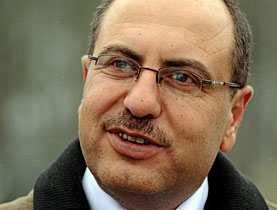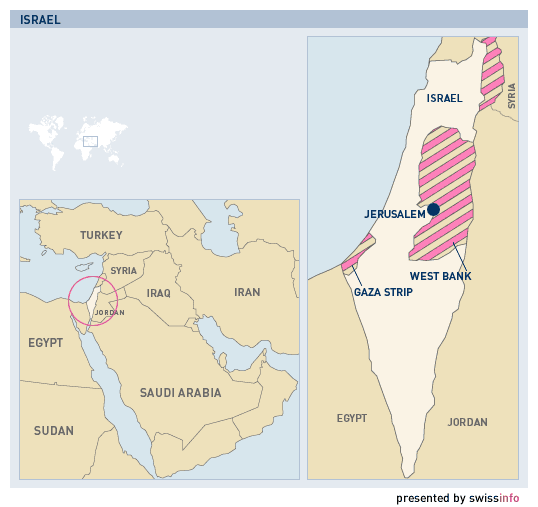Concern mounts over Gaza crisis as truce ends

The European Union has expressed its "deep concern" at the humanitarian crisis in Gaza, as a six-month truce between Israel and Hamas came to an end.
Israel’s blockade of the Gaza Strip has stretched the humanitarian situation to breaking point, Issam Younis, a prominent Gaza human rights campaigner trusted by Hamas and Fatah, tells swissinfo.
This “collective punishment” of Gaza civilians must end, says Younis, the director of the Al Mezan Center for Human Rights, while en route through Geneva.
Unable to leave Gaza for the past eight years, Israel finally allowed Younis to visit the German city of Weimar this month to receive its Human Rights Award for his work protecting the rights of Palestinians.
The Islamic Hamas group marked the end of the Egyptian-brokered truce with Israel on Friday by promising new hostilities by its Palestinian resistance factions.
Hamas said Israel had breached the truce by imposing its economic blockade of Gaza and staging military strikes.
Although there was no immediate Israeli comment about Hamas’ announcement, the government has expressed interest in prolonging “understandings” with Hamas.
Russia backed the calls by the European Union, appealing for Hamas to rethink its decision to end the truce to avoid renewed suffering among civilians.
swissinfo: What is the situation in Gaza?
Issam Younis: This is the most difficult it has been since 1967. The closure of the Gaza Strip is total and people are not allowed to travel, to come and go. One and a half million people live under siege. The population has no fuel or diesel to run power plants. Electricity is cut off for long periods.
It has become very difficult to obtain basic food and meet the simplest of needs. Eighty per cent of families in Gaza depend on UN agencies, including the UNRWA [the United Nations Relief and Works Agency for Palestine]. Unemployment affects 50 per cent of the population and 75 per cent of the population live below the poverty line.
In Gaza, there are four crossing points: one for fuel, one for people, one for trade and one for construction materials. Since 1967, Israelis have made us dependent on their country: everything that arrives and leaves Gaza must transit through these crossing points and 90 per cent of imports come from the Hebrew state.
The humanitarian situation is catastrophic. Even the UN Secretary-General and the High Commissioner for Human Rights have said that Israel must lift the blockade. This is the collective punishment of an entire people. An outright violation of the Geneva Conventions.
swissinfo: What is the political situation?
I.Y.: The international community and Israel want to isolate Hamas. But that affects all of the population and not Hamas, which controls the crossing points. It’s a stupid weapon.
Nobody can accept and justify attacks against civilians, but that does not give you the right to place a nation under siege. If you lock a cat up for three days without food and water, as soon as you open the door it will bite you. They are now pushing Gaza beyond this scenario.
For how long can a human being endure such humiliation?
swissinfo: What does Israel want?
I.Y.: Israel wants to push Gaza to break away from the West Bank. Before 1967 Gaza was under Egyptian administration and the West Bank under Jordanian administration. After 1967, they came under Israeli administration. Since 1994, the Oslo peace process has initiated a systematic policy of separation.
Israel is now pushing Gaza towards Egypt, to hand over its responsibilities. And the international community says: as you are separate, we cannot find a point of agreement.
swissinfo: Will the election of Barack Obama as the next President of the United States change anything?
I.Y.: I do not think so. I have followed his speeches: he has focused mainly on Iran and Iraq and he has spoken of Israel’s security. It is not yet clear what he will do. But Europe should play a more important role. The West Bank, Gaza and the Middle East are his backyard.
swissinfo: What do you think of the Geneva Initiative and its blueprint for Israeli-Palestinian peace?
I.Y.: It has its positive points, but we do not need new ideas. We have enough already. We know what caused the problem and we know how to fix it. The territory that has been occupied since 1967 belongs to the Palestinian state. The Palestinians have the right to return there. How? That’s a different story and the subject of negotiation.
We need an approach that is based on international law. The international community like playing the donor, but money without political pressure will not help. There is too much tolerance for Israel’s practices.
swissinfo-interview: Isolda Agazzi
“Switzerland plays an important role and not only in this part of the world. We follow with interest Switzerland’s votes on the Human Rights Council because it is not necessarily aligned with the European Union.”
“The Swiss are very familiar with the situation and are ready to intervene. It is a small country, we cannot expect miracles from it, but it is ready to play its part to try and end the misery.”
“Switzerland is an old partner of many Palestinians. It should push for the peace process. As the guardian of the Geneva Conventions, it should play a more political role.”
The Swiss Agency for Development and Cooperation, which has an office in Jerusalem, gave SFr20 million ($18 million) to Palestine in 2007.
Its projects focus on improving the prospects for peace, better living conditions, promotion of viable institutions in the long-term, support for UNRWA, the International Committee of the Red Cross and various Palestinian and international non-governmental organisations.
“The SDC does very, very good work in Palestine, particularly in supporting Palestinian civil society. But last week, the Israelis refused even the SDC representative access to the Gaza Strip,” Younis said.


In compliance with the JTI standards
More: SWI swissinfo.ch certified by the Journalism Trust Initiative












You can find an overview of ongoing debates with our journalists here . Please join us!
If you want to start a conversation about a topic raised in this article or want to report factual errors, email us at english@swissinfo.ch.